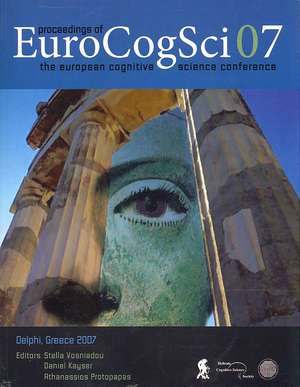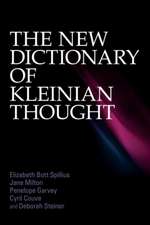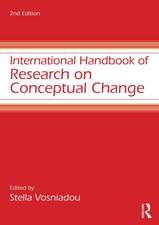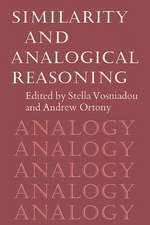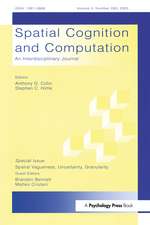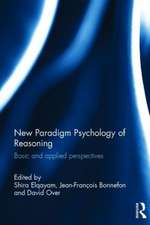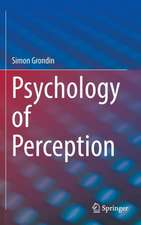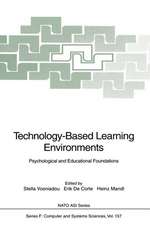Proceedings of the European Cognitive Science Conference 2007
Editat de Stella Vosniadou, Daniel Kayser, Athanassios Protopapasen Limba Engleză Paperback – 10 mai 2007
This book will be of interest to anyone concerned with current research in Cognitive Science.
| Toate formatele și edițiile | Preț | Express |
|---|---|---|
| Paperback (1) | 621.42 lei 6-8 săpt. | |
| Taylor & Francis – 10 mai 2007 | 621.42 lei 6-8 săpt. | |
| Hardback (1) | 1014.74 lei 6-8 săpt. | |
| Taylor & Francis – 2 aug 2017 | 1014.74 lei 6-8 săpt. |
Preț: 621.42 lei
Preț vechi: 815.54 lei
-24% Nou
Puncte Express: 932
Preț estimativ în valută:
118.91€ • 124.50$ • 98.63£
118.91€ • 124.50$ • 98.63£
Carte tipărită la comandă
Livrare economică 10-24 aprilie
Preluare comenzi: 021 569.72.76
Specificații
ISBN-13: 9781841696966
ISBN-10: 184169696X
Pagini: 974
Dimensiuni: 210 x 280 x 47 mm
Greutate: 1.8 kg
Ediția:2007
Editura: Taylor & Francis
Colecția Taylor & Francis
Locul publicării:Oxford, United Kingdom
ISBN-10: 184169696X
Pagini: 974
Dimensiuni: 210 x 280 x 47 mm
Greutate: 1.8 kg
Ediția:2007
Editura: Taylor & Francis
Colecția Taylor & Francis
Locul publicării:Oxford, United Kingdom
Cuprins
Preface. Invited Lectures. R.. Gallistel, Using Information Theory to Better Understand Associative Learning. N. Nersessian, Model-Based Reasoning in Distributed Cognitive-Cultural Systems: Studies of Interdisciplinary Research Labs. G. Gigerenzer, Gut Feelings: The Intelligence of the Unconscious. R. Gelman, Early Cognitive Development and Beyond. M. Boden, The History of Cognitive Science: Seven Key Dates. C. Castelfranchi, For a Systematic Theory of Expectations. C. Fuchs, Language Activity as a Representational Activity: Typological Approaches to Comparison. J. Fodor, Against Darwinism. Invited Symposia. B. Kokinov, D. Gentner, S. Christie, L.A. Doumas, K. Kurtz, R. French, Analogy-Making: Resolved and Unresolved Mysteries. T. Chernigovskaya, K. Hugdahl, I. Moen, S. Medvedev, J. Niemi, Language and Brain. H. van Rijn, S.L. Frank, A. Dubey, M.R. Mayberry, S. Sprenger, Computational Psycholinguistics beyond Words. P. Gärdenfors, L. Barrett, B. Hare, Cooperation and the Evolution of Cognition. K. Moutoussis, S. Zeki, L. Muckli, J.-D. Haynes, Consciousness and the Brain. E. De Corte, S. Vosniadou, B. Csapó, H. Mandl, R. Stark, N. Miyakee, Can Design Research Contribute to Bridge the Gap between Theory and Educational Practice? Symposia. P. Panagiotaki, C. Guariglia, J. Wiener, A. Berthoz, Neurocognition of Human Spatial Memory: New Approaches, Tests and Technologies. Y. Hagmayer, D. Hilton, D. Lagnado, C. Walsh, J. McClure, J. Bonnefon, F. Costello, Causal Reasoning in Practice – How Causal Assumptions Affect Explanations, Inferences and Decision Making. M. Coppola, S. Goldin-Meadow, E. Spaepen, D. Gentner, A Ozyurek, D.B.M. Haun, C.J. Rapold, G. Janzen, S. Levinson, Thinking With and Without Language. A. Serino, K. Fotopoulou, M.s Tsakiris, F. de Vignemont, The Body: From Experience to Representation. C. Castelfranchi, ESF Panel, Metacognition, Mindreading and Self-Consciousness. Papers. Reasoning and Argumentation. L. Louca, D. Hammer, Elementary Student Nascent Abilities for Scientific Argumentation. L. Louca, Z. Zacharia, Nascent Abilities for Scientific Inquiry in Elementary Science. R. Schwonke, J. Wittwer, V. Aleven, R. Salden, C. Krieg, A. Renkl, Can Tutored Problem Solving Benefit from Faded Worked-out Examples? A. Foustana, K. Luwel, L. Verschaffel, Effects of Feedback on the Strategic Competence of Gifted Children. T. Engelmann, S.-O. Tergan, "Knowledge and Information Awareness" for Enhancing Computer-Supported Collaborative Problem Solving by Spatially Distributed Group Members. Categorization. A. Utsumi, M. Sakamoto, Computational Evidence for Two-Stage Categorization as a Process of Adjective Metaphor Comprehension. V. Bazzarin, A.M. Borghi, A. Tessari, R.. Nicoletti, Is a Small Apple More Like an Apple or More Like a Cherry? A Study with Real and Modified Sized Objects. R. Minervino, N. Oberholzer, A.L. Alonso, False Memory for Analogical Inferences: An Indicator of Representational Change of the Target Text but Not an Indicator of Representational Change of the Target Issue. S. Kalenine, F. Bonthoux, Adults Differently Process Taxonomic and Thematic Semantic Relations According to Object Kinds. D. Heussen, J.A. Hampton, ‘Emeralds are Expensive Because They are Rare’: Plausibility of Property Explanations. Eye and Language. H. Kobayashi, T. Yasuda, A Flow-of-Conversation Plays a Role: Examining Line-of-Regard of Young Children and Adults in a Discrepant Labeling Situation. C. Bohn, R. Kliegl, Post-Interpretive Processes Influence Interpretive Processing During Reading: Evidence from Eye Movements. N. Ellis, Learned Attention in Language Acquisition: Blocking, Salience, and Cue Competition. J. Apel, P. Knoeferle, M.W. Crocker, Processing Parallel Structure: Evidence from Eye-Tracking and a Computational Model. A. Dubey, F. Keller, P. Sturt, The Effect of Phonological Parallelism in Coordination: Evidence from Eye-Tracking. Conceptual Change. J. Humberstone, R. Reeve, Conceptual Changes in the Acquisition of Fractional Number Understanding. C.S.C. Asterhan, B.B. Schwarz, Conceptual Change in Evolutionary Theory: The Effects of Scripted Argumentative Monologue in Peer Settings. O. Lappi, Conceptual Change in Cognitive Science Education – Towards Understanding and Supporting Multidisciplinary Learning. C. Stathopoulou, S. Vosniadou, A Role for Personal Epistemology in Conceptual Change in Physics. Language Acquisition. J. Fodor, W. Sakas, A. Hoskey, Implementing the Subset Principle in Syntax Acquisition: Lattice-Based Models. R. Le Calvez, S. Peperkamp, E. Dupoux, Bottom-up Learning of Phonemes: A Computational Study. W. Goh, M. Chen, The Bilingual Phono-Translation Effect: Facilitation or Inhibition Depends on Second-Language Proficiency. S. Verbrugge, Frequency and Lexical Marking of Different Types of Conditionals by Children and Adults in an Elicitation Task. Reasoning and Cooperation. S. Kiyokawa, K. Ueda, T. Okada, Effects of Other-Generated Hypothesis on Hypothesis Revision. F. Giardini, G. Di Tosto, Cooperation through Communication: Reciprocal Exchange of Relevant Information among Humans Involved in Strategic Interaction. M. Grinberg, E. Hristova, Is Cooperation in the Iterated Prisoner’s Dilemma Game due to Social Interaction? Y. Nagata, S. Ishikawa, T. Omori, K. Morikawa, Computational Model of Cooperative Behavior: Adaptive Regulation of Goals and Behavior. Emotion. M. Van den Noort, P. Bosch, K. Hugdahl, Conscious and Unconscious Processing of Emotional Words. A. Kafkas, S. Scott, Differential Effect of Spectral Detail in Perceiving Identity, Emotion and Intelligible Speech from Voice: Exploring the Face Analogy. P. Viviani, C. Fiorentini, Recognizing Emotions from Faces: Do We Look for Specific Facial Features? C.N. Pathirannehelage, R. Suzuki, N. Watanabe, H. Yoshida, H. Yamada, H. Harashima, Human Recognition of Faces and PCA-Based Machine Recognition: The Effect of Distinctiveness. Knowledge Construction and Change. H. De Cruz, J. De Smedt, How Material Culture Extends the Mind: Mental Time-Travel and the Invention of the Calendar. R. Schwonke, A. Renkl, K. Berthold, Knowledge Construction with Multiple External Representations: What Eye-Movements Can Tell Us. I. Skopeliti, S. Vosniadou, Reasoning with External Representations in Elementary Astronomy. V. Crawford, Adaptive Expertise as Knowledge Building in Science Teachers’ Problem Solving. J. Staszewski, Modeling Human Expertise for Instructional Design: Applications to Landmine Detection. Morphology. L. Jia, W.D. Goh, Are Long Words Holistically Processed? De-Individuation Effects of Embedded CVC Clusters. H. Marchal, M. Bianco, P. Dessus, B. Lemaire, The Development of Lexical Knowledge: Toward a Model of the Acquisition of Lexical Gender in French. D. Fabre, M. Hoen, F. Meunier, Role of Surface Frequency on Morphological Family Organization. J. Arciuli, P. Monaghan, Implicit Cues to Grammatical Category in the Orthography of English. Philosophical Issues. A.-M. Rusanen, O. Lappi, The Limits of Mechanistic Explanation in Neurocognitive Sciences. A. Linhares, Free Will and the Power of Veto: Convergent Evidence from Decision-Making. S. Elqayam, Normative Rationality and the Is-Ought Fallacy. A. Arapinis, The Case of Hyper-Intensionality in Two-Dimensional Modal Semantics: A False Problem Due to a Misunderstanding. Learning. A. Chuderski, A Model of Flexible Control in Task Switching. H. Foundalis, M. Martínez, A Generalization of Hebbian Learning in Perceptual and Conceptual Categorization. R. Cowell, R. French, An Unsupervised, Dual-Network Connectionist Model of Rule Emergence in Category Learning. A. Hyvarinen, Behavioural Priors: Learning to Search Efficiently in Action Planning. S.C. Musca, J. Barra, M. Mermillod, T. Atzeni, Evidencing Implicit Sequence Learning through the Process Dissociation Procedure: A Case against Previous Conclusions. Reasoning and Uncertainty. R. Maguire, P. Maguire, M. Keane, Understanding Surprise: Can Less Likely Events be Less Surprising? H. Matute, M. A. Vadillo, F. Blanco, S.C. Musca, Either Greedy or Well Informed: The Reward Maximization–Unbiased Evaluation Trade-off. M. Jorgensen, Individual Differences in How Much People are Affected by Irrelevant and Misleading Information. A. Harris, A. Corner, U. Hahn, Estimating the Probability of Negative Events. F. Costello, Testing a Causal Attribution Account of the Conjunction Fallacy. Perception. A. Raftopoulos, Does Attentional Modulation of Early Vision Entail the Cognitive Penetrability of Perception? C. Aymoz, P. Viviani, Biological Movements are Detected Faster than Artificial Ones. P. Hristova, B. Kokinov, Perceptual Learning vs. Context-Sensitive Retrieval: Why People Judge Green Lines being Shorter/Longer than the Red Lines with the Same Length? Do they Perceive them Differently or Do They Retrieve a Biased Set of Alternatives in their Comparison Set? F. van der Velde, M. de Kamps, A Neural Model of Global Visual Saliency. A. Vatakis, C. Spence, Investigating the Factors that Influence the Temporal Perception of Complex Audiovisual Events. Analogy. G. Petkov, K. Kiryazov, M. Grinberg, B. Kokinov, Modeling Top-Down Perception and Analogical Transfer with Single Anticipatory Mechanism. S. Christie, D. Gentner, Relational Similarity in Identity Relation: The Role of Language. M. Mutafchieva, B. Kokinov, Does the Family Analogy Help Young Children to do Relational Mapping? L. Hoddeson, Analogy and Cognitive Style in the History of Invention: Inventor Independence and Closeness of Compared Domains. Semantics and Pragmatics. P. Maguire, E. Wisniewski, G. Storms, A Corpus Analysis of Conceptual Combination. A. Alishahi, S. Stevenson, A Computational Usage-Based Model for Learning General Properties of Semantic Roles. V. Demeure, J.-F. Bonnefon, E. Raufaste, "Is There Any Coffee Left, Boss?" Face and Utility Concerns in the Interpretation of Ambiguous Questions/Requests. L. Connell, L. Rayne, D. Lynott, Time Flew By: Reading about Movement of Different Speeds Distorts People's Perceptions of Time. Computer and Formal Models. F. Van Overwalle, A Recurrent Connectionist Model of Retrospective Cue Interaction in Humans. M. Heinath, J. Dzaack, A. Wiesner, L. Urbas, Simplifying the Development and the Analysis of Cognitive Models. M. Ochs, C. Pelachaud, D. Sadek, Emotion Elicitation in an Empathic Virtual Dialog Agent. J. Bach, Motivated, Emotional Agents in the MicroPsi Framework. Memory. A. Hupbach, R. Gomez, O. Hardt, L. Nadel, Updating Episodic Memories: A Special Role of Spatial Context. K. Luwel, V. Camos, L. Verschaffel, The Role of Working Memory in the Use of Numerosity Judgment Strategies. J.-P. Thibaut, A Memory Account of Children’s Failure to Generalize Novel Names to Novel Instances and Novel Scenes. K. Marton, L. Kelmenson, The Impact of Inhibition Control on Working Memory in Children with SLI. E. Hannon, A. Richards, Inattentional Blindness: An Investigation into the Effects of Working Memory Capacity and Processing Speed – An Individual Differences Approach. Models and Representations. B. Nanay, Amodal Perception: Access or Visualization? S. Kobori, P. Haggard, Internal Models and Transfer of Learning in Pursuit Tracking Task. S.J. Buechner, C. Hoelscher, G. Strube, Path Choice Heuristics for Navigation Related to Mental Representations of a Building. C. Recanati, Characteristics of Diagrammatic Reasoning. J. Hampton, D. Francis, G. Robson, Imagery and the Interpretation of Ambiguous Noun-Noun Combinations. Neurocognition. A. Simoes, P. Largy, Do Implicit Learning Abilities Depend on the Type of Material to Process? A Study on Children with and without Dyslexia. L. Messinis, E. Lyros, P. Papathanasopoulos, Effects of Depression on Neurocognitive Performance in Different Stages of Parkinson’s Disease. N. Green, G. Ramakers, Consequences of Genetically Induced Changes in Neuronal Morphology for Information Processing at the Single Neuron Level. J.S. Sainz, R. Garcia-Zurdo, Brain Correlates of Syllable and Non-Syllable-Based Word Parsing. A. Tessari, G. Ottoboni, V. Bazzarin, Is Sidedness Influenced by Action Directionality? Papers Presented as Posters. Posters. Author Index.
Notă biografică
Stella Vosniadou, Daniel Kayser, Athanassios Protopapas
Descriere
This volume contains the invited lectures, invited symposia, symposia, papers and posters presented at the 2nd European Cognitive Science Conference held in Greece in May 2007.
